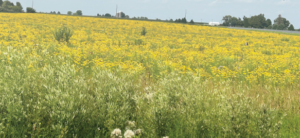Cruise down 350th Street in Osage and eventually you will drive past an eye-catching swath of land vibrant with wildflowers and butterflies.
This 34-acre spread is the Jiri-Rita Prairie Park, which was developed by Valent BioSciences with support from CIRAS. The park symbolizes the value of connections: an Iowa company’s connection to its corporate values; CIRAS’s connections to Iowa manufacturing and to the resources of Iowa State University; and, ultimately, connections to the land and the environment.
Valent BioSciences specializes in biorational crop inputs, which are considered to be more environmentally friendly than many conventional products. The park is adjacent to the company’s Osage manufacturing facility and was once farmland. When Valent BioSciences established a solar farm nearby, company leaders learned of concerns about solar farms being near farmable ground because of dust and dirt. The idea of transforming the land into a natural prairie was launched.

Valent BioSciences turned to CIRAS for help.
“We’ve worked with CIRAS for a long time and have reached out for many types of questions related to safety, packaging, and environmental and biological issues,” said Brian Lynch, facility manager for Valent BioSciences. “People don’t always realize how CIRAS can help with a range of things.”
Rachel Hahn, CIRAS strategic advisor, notes the park is in line with Valent BioSciences’ sustainability-focused values and mission. Working with a company like Valent BioSciences is not unusual for CIRAS, but doing a park project was a bit out of the ordinary.
Valent BioSciences “is a diverse, forward-thinking company. Their values are centered around communities, the environment, and people,” she said. “This project pushed boundaries and shows how CIRAS can go broader than typical manufacturing objectives and support your company’s overall vision and mission.”

CIRAS first suggested Valent BioSciences reach out to local like-minded organizations such as Pheasants Forever and the Mitchell County Conservation Board. Both organizations supported the project. Valent BioSciences was also able to secure a $5,000 USDA grant. The park’s connection to the community is strong, with the Mitchell County 4-H donating handmade birdhouses and students with the Osage High School Industrial Technology program building a welcome kiosk.
The actual design of the park was a challenge, so Lynch once again turned to Hahn, who helped Valent BioSciences set up a capstone project involving students from Iowa State’s agricultural and biosystems engineering program.
“This is a generation of students who care significantly about sustainability and the environment, so it was fantastic to connect them with a real-life project and a company with similar interests,” Hahn said.
“We had three students who met with us regularly,” Lynch said. “They helped us with everything from how we should put in our trails to what additional plantings we should do to attract insects, birds, and wildlife. It was a big learning experience because we don’t have horticulturists. We have entomologists and engineering, but nobody with this kind of experience.”
The capstone team also recommended a burn plan, which is vital to maintaining the health of a native prairie.
The park, a popular destination for school fields trips, supports an ecosystem teeming with flora and fauna. The park also offers visitors a mile-long outer loop trail and four walking paths, named in honor of people who have contributed to the strength of Valent BioSciences and the community of Osage.
CIRAS has also helped Valent BioSciences connect with Iowa State resources on two other sustainability-related projects. One involves testing a nutrient-rich byproduct of Valent BioSciences’ fermentation process. An Iowa State agronomist has been testing the liquid to help Valent BioSciences determine if it has commercial value.
“They wanted to understand conceptually if this was worth something. The results of the first year of testing were outstanding,” said Hahn.
CIRAS also connected Valent BioSciences with an Iowa State agronomist who is doing soil testing in the park. Valent BioSciences makes a product that enhances the symbiotic relationship of a certain fungi and microbes in soil. They are applying the product on the soil in the park and will do multiyear testing to see the effect on soil health.
Jiri-Rita Prairie Park was officially dedicated in June and has become a popular spot for area residents. Lynch himself visits it a few times a week.
“It makes me feel really good. The flowers are unreal and it’s unbelievable how many birds and butterflies and insects there are out there,” he said. “I never thought I’d be a prairie guy, but this has really converted me.”
For more information, contact Rachel Hahn at rhahn@iastate.edu or 515-620-8093.